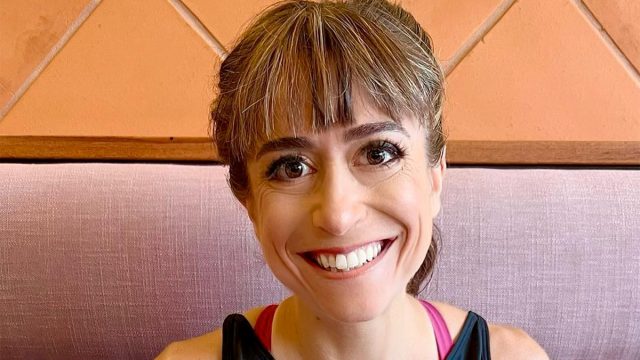7 Tips to Build Muscle After 50 and Keep You in the Best Shape Ever
If you believe you are "too old to gain muscle," think again, says one fitness expert. Cori Lefkowith is the founder of Redefining Strength and is devoted to helping people get in shape no matter their age. "Stop lying to yourself. Stop giving yourself an excuse not to work hard and move forward. Because while our body needs and goals do change as we get older, and yes, it a hundred percent becomes harder to build and retain the muscle, we can still achieve fabulous results and build muscle at any and every age," she says in one viral YouTube video, offering 7 tips on how to build muscle after 50.
Many People "Cling to Improper Dieting and Workout Practices" That Worked When They Were Younger
According to Lefkowith there might be a big mistake you are making. "The reason we don't see the results we want as we get older is because we cling to improper dieting and workout practices that we may have gotten away with when we were younger," she says.
Instead, You Need to Adjust with Age
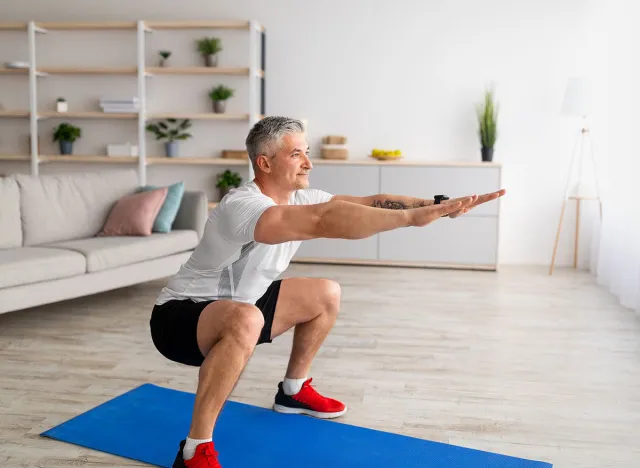
"At every stage of life, we need to be adjusting our fueling and our training. Nothing works forever. Our body and lifestyle are constantly evolving and so should our diet and training habits meet us where we're at currently so we can always move forward and be functionally strong till a final day on this planet," she says. "That's why I wanna share with you seven tips to maintain your lean muscle and even gain muscle as you get older."
Tip 1: Use It Or Lose It
Tip number one is use it or lose it, says Lefkowith. "So often the reason we see more dramatic shifts in body composition and lose more muscle mass as we get older is because we've stopped doing what makes us fitter and stronger. We simply accept decline, and we use age as an excuse instead of finding ways to really challenge ourselves, things do get harder. We may feel more awkward with balance moves. We may feel like we even recover slower. We may even dislike coordination moves because they're uncomfortable. Even mainstream media has been telling people to stop doing what kept them strong in the first place, but if you don't use it, you'll lose it," she says.
Do Moves That Challenge Your Coordination
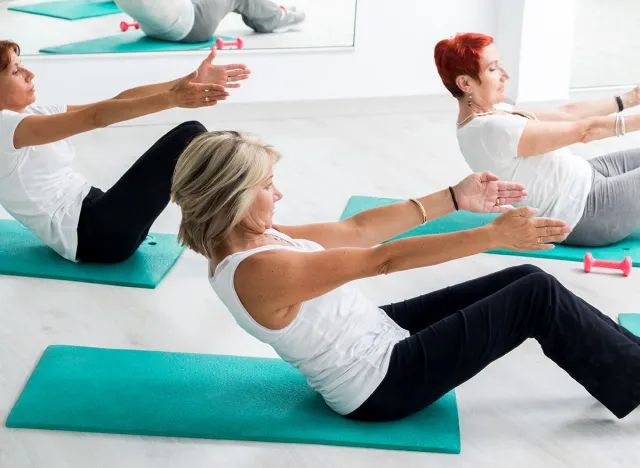
"If you wanna keep your mind-body connection strong, which can lead to better muscle hypertrophy or muscle gains, you've gotta do moves that challenge your coordination," she continues. "And if you not only wanna gain muscle, but stay functionally strong and avoid falls, you've gotta do those awkward balance moves. Use it or lose it. Keep challenging yourself and training those movement patterns in the gym so you move better in everyday life."
Tip 2: Stop Dieting

"Tip number two, stop dieting," she says. "Muscle helps keep our metabolic grade higher. It helps us burn more calories to rest and stay leaner. As we get older, we become less able to utilize protein as efficiently, making it even harder to build and retain lean muscle mass. But this is why it's even more key."
Larger Caloric Deficits Will Make It Harder to Lose Weight and Keep It Off
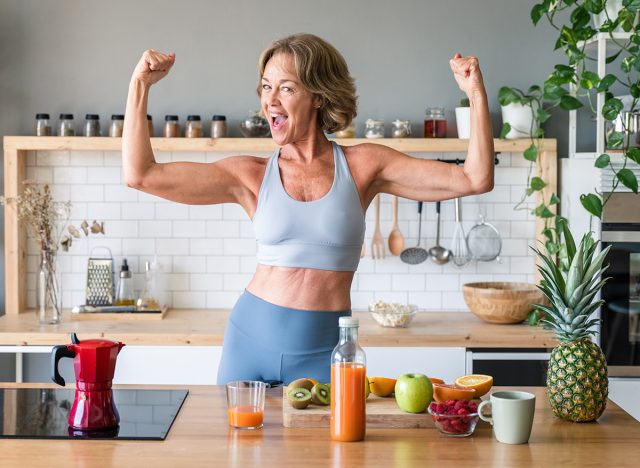
If you continue aiming for "larger and larger calorie deficits" it "ultimately sabotages" results. "It leads to more muscle mass being lost in the process of us trying to lose weight, which only leads to metabolic adaptations and worse body composition. It leads to us actually making it harder on ourselves to lose the weight and keep it off. Plus the metabolic adaptations mean we burn even fewer calories at rest. This leads to us then slashing our calories lower and lower to try and keep losing, perpetuating the horrible weight gaining cycle as we get older," she says.
Instead, Fuel Lean Muscle Mass
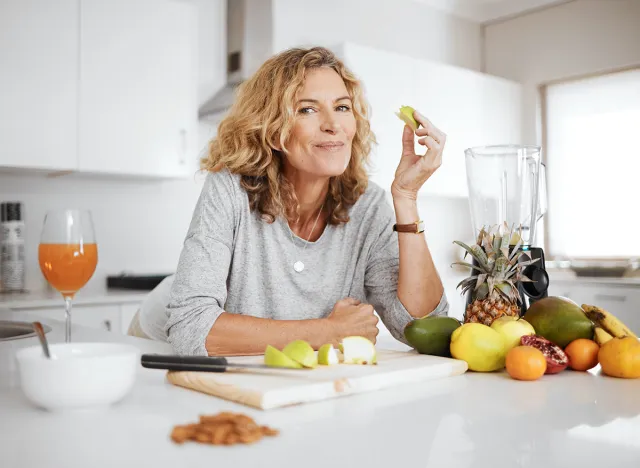
"Instead, we need to focus on fueling that lean muscle mass," she says. "We need to focus on macros first in a very slight calorie deficit so we can help ourselves retain that lean muscle. Even as we wanna lose fat, we may even find we first need to retrain our body to eat more so we can build that lean muscle with a small calorie surplus before we even consider creating a slight deficit to lose."
Tip 3: Do Moves That Challenge You
"Tip number three, do moves that challenge you," she says. "Many of us have heard that strength training is key to gaining muscle, especially as we get older, and it is by challenging our muscles, we force them to rebuild and grow stronger. It's why we don't wanna fear heavy lifting as we get older."
Lift Heavy
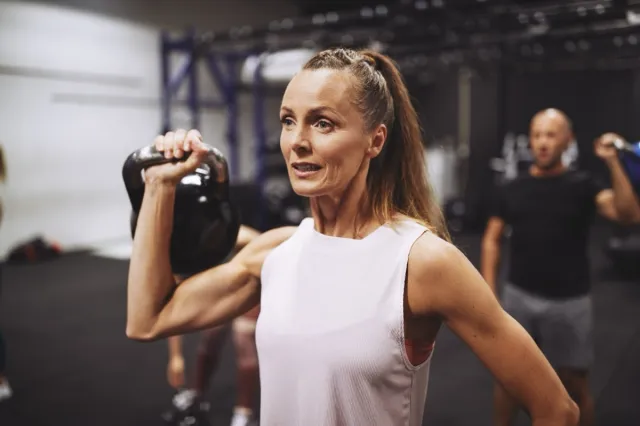
"The key is recognizing what lifting heavy is. For us, it may mean body weight training starting out, especially if you haven't trained before or haven't trained consistently in a while, or maybe using resistance bands or dumbbells over barbells. The key is not fearing loads and truly challenging yourself instead of going lighter just because you've hit a certain age. Fitness is about ability, period. We always have to meet ourselves where we're at," she continues.
Don't Avoid "Awkward or Uncomfortable" Moves
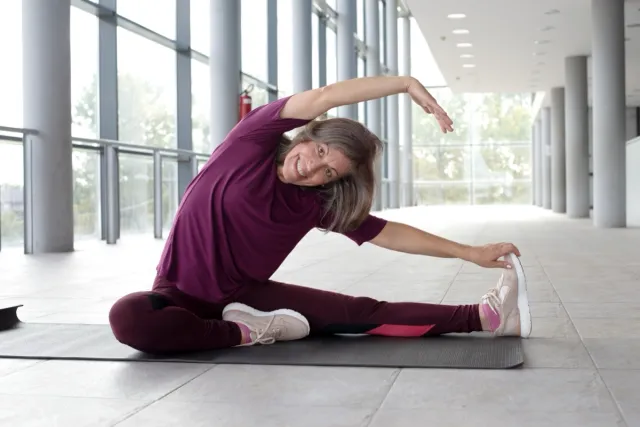
"This also means we can't avoid awkward or uncomfortable moves that challenge our mind-body connection," she says. "Neuromuscular efficiency or that ability to recruit muscles quickly and in the right sequences to perform movements is key to us moving well and even improving our reaction times and coordination in everyday life. Not to mention that ability to recruit muscles quickly, that muscle activation will also improve your muscle hypertrophy results. So if you wanna be able to gain more muscle, you wanna improve that mind-body connection with moves that challenge your balance and your coordination while also challenging yourself with loads."
Tip 4: Increase Protein Portions

"Tip number four, increase your protein portions per meal," she recommends. "As we get older, we can develop anabolic resistance and we are less able to utilize protein as efficiently. This means we actually need to increase our protein intake, especially when we're training hard and lifting to build muscle because our muscles don't respond by increasing muscle protein synthesis in the same ways when we're younger."
20 to 30 Grams of Protein Per Meal Is Key
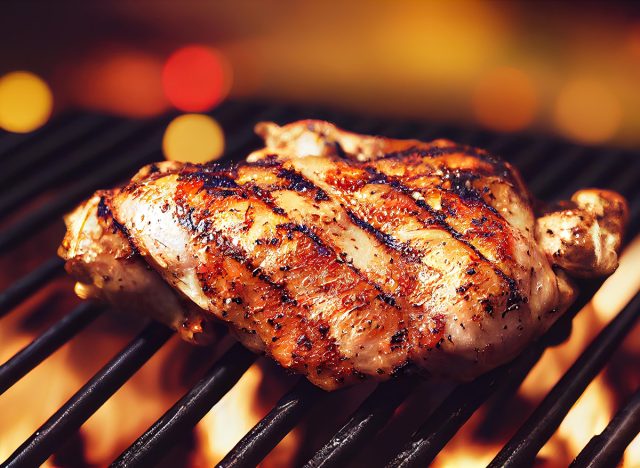
"Increasing a portion of 20 grams of protein to 30 may be super key," she suggests. "And if we're training harder, you may see an even better benefit from 40 grams, especially after a hard training session."
Divide Protein Throughout the Day
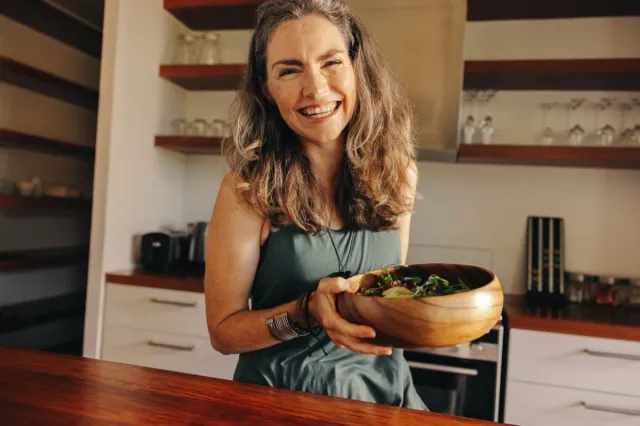
"The reason I don't just say increased protein intake overall is because as we get older, we can also often see a decline in our appetite. This decline in appetite can be purely age related, but it can also be based on how we fueled in the past to try and lose weight with more extreme deficits. It can also be hard to eat a ton of protein in one sitting because it can make us feel fuller," she says. "By increasing our intake, each meal over trying to get in a ton of protein at one meal, and even adding in a pre and post-workout snack that is protein centric, we can break up our protein intake to see results."
You Can Also Supplement

You may even find that you can see an added benefit from BCAA supplementation during your workouts as leucine especially is so critical to stimulate muscle protein synthesis," she says. "There can also be some benefit of breaking up your protein intake to keep a positive protein balance multiple times a day to promote better muscle growth."
Tip 5: Do Mobility Work
Tip number five, do your mobility work. "We can see changes in our recovery and aches and pains can feel like they're adding up so much more as we get older. Too often we simply blame our age over recognizing the movement compensations and balances, overuse and overload that have been occurring for years that we haven't addressed. But whatever the reason, we can't ignore these issues if we wanna be able to train hard consistently to see result," she says.
It Helps You Move Better and Recover Faster
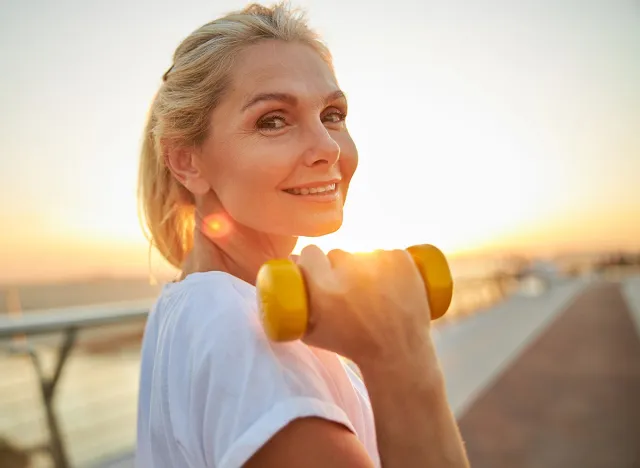
Mobility work "is so key" because "it can help us move better and recover faster, even helping us better manage chronic inflammatory conditions that could fight our muscle gains so we can train consistently and challenge ourselves to build that lean muscle without proper recovery," she says. "We end up training to a point of diminishing returns where we're just constantly beating our body down over allowing for proper recovery and growth. When we rest, we rebuild."
Do 5 to 10 Minutes a Day

"We do this mobility work in every warmup so we can train to build that lean muscle more efficiently. You'll be surprised by how much even five to 10 minutes of mobility work a day helps you train harder without needing extra days off to recover," she says.
Be Strategic with Meal Timing

"Tip number six, be strategic in your meal timing. I say this as a person who personally loves intermittent fasting as a meal timing. Fasting can backfire when gaining muscle is your goal, especially if you're a hard gainer," she says. "And as we get older, we have to realize that fasting and fasted training may hinder us from gaining muscle. As in a fasted state, your muscle protein balance is negative. Basically, you break down more muscle than you build. So we put ourselves at greater risk for losing muscle the more we put ourselves in this negative protein balance. Not to mention when you train fasted, you don't necessarily have that readily available stored fuel. You need to truly push hard during a session and rebuild after you've created the muscle tissue damage."
Eat a Pre-Workout Meal
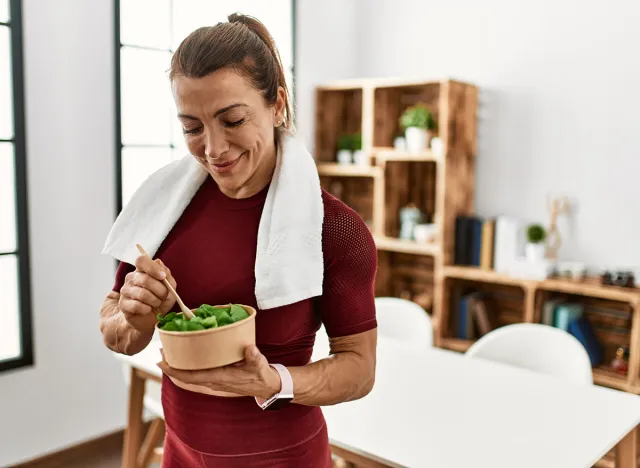
She recommends considering including a pre-workout meal with protein "to have amino acids readily available in your system, and even a carb source for immediate fuel to allow you to push harder in your sessions without fatigue," she says. "Studies have found the resistance exercise combined with amino acid ingestion elicits the greatest anabolic response and may assist the elderly in producing a youthful muscle protein synthetic response. Provided sufficient protein is ingested following exercise. This post-workout protein consumption can even help you improve your recovery. So you can include more hard training sessions over the week."
Tip 7: Stay Active on Recovery Days

The final tip? "Stay active on your days off," she says. "Recovery and rest days don't have to be do nothing days. And the more we can actually use these days to prep our body to move better during our training sessions, the better off we'll be. Include five to 10 minute mobility routines."
Take a Walk
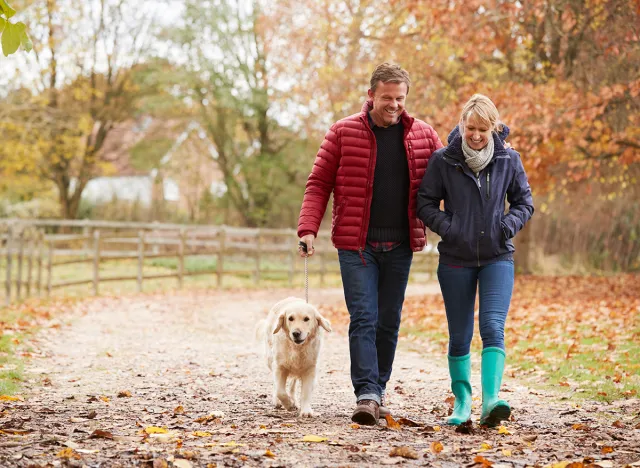
One activity she recommends is going for a long walk. "Honestly, walking is one of the most underutilized tools we have to stay functionally stronger and improve our body composition even as we get older. Walking can help us avoid unwanted fat gain, keep our aerobic base strong, and even help us recover from previous training sessions without being catabolic to our muscle mass. Unlike more intense forms of steady state cardio, walking can also be a great way to destress and help our mind and body recover," she explains.
Or, Do Other "Light Movement"

"So as much as it can be hard to take a day off, your body needs it, your muscles repair and rebuild when you give them time to recover. But to stay active, don't be afraid to include light movement and mobility work on those days off. You may be surprised by how much even this light activity helps you sleep better," she says.
Bottom Line: You Can Build Muscle at Any Age
Her final message? "We can and should focus on building muscle at any and every age. We are never too old to see results and our workout routine and diet should always be based on our needs and goals, meeting us where we're at currently, but our age," she says. "That simple number should never determine what we can or can't do. We have to remember that if we wanna stay strong, it really is a case of use it or lose it." And if you enjoyed this article, take advantage of these 15 Quick Ways to Lose Body Fat Percentage in a Week.
